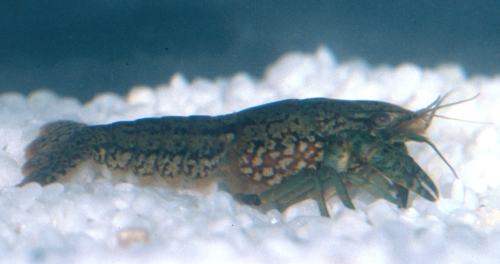Scientists at Cefas (the Centre for Environment, Fisheries & Aquaculture Science) and Defra (the Department for Environment, Food and Rural Affairs) have recently become aware of increasing numbers of non-native crayfish for sale in UK aquatic outlets and garden centres. Of particular concern is the number of marbled crayfish being found.
The marbled crayfish (Procambarus sp.) is the first recorded crayfish capable of asexual reproduction (parthenogenesis). An adult is capable of producing up to 270 eggs every 8–9 weeks with sexual maturity being reached 25–35 weeks after hatching, under optimum conditions. This means that only one animal is required to establish a breeding population.
Because the marbled crayfish can reproduce so rapidly, hobbyists could pass excess stock onto other hobbyists, pet shops, or even release them into the wild. Marbled crayfish can survive in temperate water, so there is a concern that this alien species will become established in Great Britain if released. The release of any non-native species to the wild in Great Britain is an offence under the Wildlife and Countryside Act 1981.
Dr Paul Stebbing, a crayfish specialist at Cefas’ Fish Health Inspectorate, said: “To maintain their breeding programme, marbled crayfish use vast amounts of energy. So they are voracious feeders and will consume a broad range of aquatic plants and invertebrates, and scavenge on other food sources. This poses a risk that they may have a direct impact on native aquatic fauna and flora if released to natural waters.â€
And there is more bad news: “Marbled crayfish act as carriers of the crayfish plague – a fungal infection to which our native crayfish species is highly susceptible,†said Dr Birgit Oidtmann, crayfish plague specialist at Cefas. “This same disease was brought into the UK by signal crayfish from North America, with serious impacts on native populations.â€
It is illegal to keep non-native crayfish even as pets in England and Wales, except with a licence issued under the Prohibition of Keeping of Live Fish (Crayfish) Order 1996. No licences have been, or will be, issued to enable the keeping of temperate species such as the marbled crayfish as pets.
To help prevent the marbled crayfish spreading into the wild, Cefas advise that anyone holding marbled crayfish, or who may have information about UK sources of this species, should contact the Fish Health Inspectorate on 01305 206673 or email fish.health.inspectorate@cefas.co.uk. The Inspectorate will advise callers on the safe removal of any non-native crayfish in their possession, and provide advice to ensure that ornamental fish dealers do not continue to import such animals.









